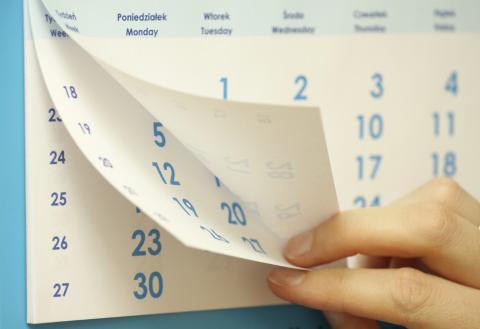Learning how to read dates is one of the most basic things when learning a new language, and it’s essential in everyday life. For instance, you use dates when making appointments, buying tickets for a particular day, asking for someone’s birthday, etc.
Expressing the date in Japanese isn’t very complicated. The date in Japanese mostly follows the counter system, with just a few exceptions; English, on the other hand, has different names for the months and days of the week.
You’ll be able to learn dates in Japanese much easier once you know Japanese numbers. If you’re not yet familiar with numbers in Japanese, please visit Japanese Numbers on our website.
Table of Contents
- How are Dates Usually Expressed in Japanese?
- How to Say the Years in Japanese
- How to Say the Months in Japanese
- How to Say the Days in Japanese
- How to Say the Days of the Week in Japanese
- Practical Phrases to Talk about Dates in Japanese
- Conclusion: How JapanesePod101 Can Help You Learn More Japanese
1. How are Dates Usually Expressed in Japanese?
How to say dates in Japanese is very simple. Dates in Japanese writing start with the year, then the month, and finally the day. The only exception is when there’s a particular instruction to write it a different way, such as on an entry form.
1- How to Write Dates in Japanese
1. April 30, 2019 is written as follows:
2019年4月30日 or 2019/04/30
- 年 (nen) : year
- 月 (gatsu) : month
- 日(nichi) : day
2. With the days of the week, Tuesday, April 30th, 2019 is written as follows:
2019年4月30日 (火曜) or 2019年4月30日 (火)
- The days of the week are usually indicated in a round bracket ( ) and placed after the day.
- The name of the day is expressed in a short form.
Tuesday is 火曜日(ka-yōbi), but when it’s expressed in a written form, it usually becomes 火曜 (ka-yō) or just 火 (ka).
2- How to Read Dates in Japanese
2019年4月30日 (火曜) is read as follows:
Ni-sen jū-kyū / nen / shi / gatsu / san-jū / nichi / ka-yō
Literally translated as:
Two-thousand ten nine / year / four / month / three ten / day / Tuesday
To listen to the pronunciation of basic Japanese numbers, please visit Numbers on our website.
3- Examples
- 今日は2019年1月13日です。
Kyō wa ni-sen jū kyū-nen ichi-gatsu jū-san-nichi desu.
Today is January 13th, 2019. - 私は1990年5月1日生まれです。
Watashi wa sen kyū-hyaku kyū-jū-nen go-gatsu tsuitachi umare desu.
I was born on May 1st, 1990. - 試験は2019年8月30日です。
Shiken wa ni-sen jū kyū-nen hachi-gatsu san-jū-nichi desu.
The examination is on August 30th, 2019.
In Japan, keeping the date and time for appointments is very important. Please don’t mix up months and dates!
2. How to Say the Years in Japanese
1- Gregorian Calendar
The Gregorian calendar is very common in Japan to express the years.
Just say the year and then add “nen (年)” which is a year counter meaning ‘year’.
- 1575年 : sen go-hyaku nana-jū go-nen
- 1998年:sen kyū-hyaku kyū-jū hachi-nen
- 2003年:ni-sen san-nen
In some cases, numbers can be expressed with the last two digits as a short version.
For example, 1998 is 98年 (kyū-jū hachi-nen).
2- Japanese Era Calendar
Did you know that there’s also a Japanese calendar?
The Japanese people use 和暦 (Wareki), or the Japanese era calendar, which is based on the reigns of Japanese emperors. The previous era was called 平成 (Heisei), which started on January 8, 1989, when the previous Emperor, Akihito, acceded to the throne following the death of his father. The current era is called 令和 (Reiwa), which started on May 1, 2019, when the current Emperor, Naruhito, acceded to the throne following the abdication of his father.
2019 is the first year of the Reiwa era. It’s written as 令和1年 and read as Reiwa ichi-nen.
This traditional Japanese era calendar is often used for official occasions and in written form, such as in official documents used for public services at a city hall.
3- Vocabulary for Describing Relative Years
- 今年 ことし (Kotoshi) : This year
- 去年 きょねん (Kyonen) : Last year
- 一昨年 おととし (Ototoshi) : The year before last year
- 来年 らいねん (Rainen) : Next year
- 再来年 さらいねん (Sarainen) : The year after next year
- 閏年 うるうどし (Urūdoshi) : Leap year
- 毎年 まいとし (Maitoshi) : Every year
4- Examples
- 今年は2019年です。
Kotoshi wa ni-sen jū kyū-nen desu.
This year is 2019. - 来年の2020年はうるう年です。
Rainen no ni-sen ni-jū-nen wa urūdoshi desu.
The next year of 2020 is a leap year. - 2005年は平成17年です。
Ni-sen go-nen wa Heisei jū nana-nen desu.
2005 was year seventeen of the Heisei era. - 私は2012年に結婚しました。
Watashi wa ni-sen jū ni-nen ni kekkon shimashita.
I got married in 2012.
3. How to Say the Months in Japanese
1- Saying the Month in Japanese: Japanese Months
Using months and dates in Japanese is very simple. It follows this simple pattern, without exception:
Name a number (1-12) of the month, and then just add 月 (gatsu), which is a month counter meaning “month.”
| English | Kanji | Hiragana | How to read | |
|---|---|---|---|---|
| 1 | January | 一月 | いちがつ | ichi-gatsu |
| 2 | February | 二月 | にがつ | ni-gatsu |
| 3 | March | 三月 | さんがつ | san-gatsu |
| 4 | April | 四月 | しがつ | shi-gatsu |
| 5 | May | 五月 | ごがつ | go-gatsu |
| 6 | June | 六月 | ろくがつ | roku-gatsu |
| 7 | July | 七月 | しちがつ | shichi-gatsu |
| 8 | August | 八月 | はちがつ | hachi-gatsu |
| 9 | September | 九月 | くがつ | ku-gatsu |
| 10 | October | 十月 | じゅうがつ | jū-gatsu |
| 11 | November | 十一月 | じゅういちがつ | jū ichi-gatsu |
| 12 | December | 十二月 | じゅうにがつ | jū ni-gatsu |
In order to listen to the pronunciation of the months in Japanese, please visit Talking about Months on our website.
2- Relative Vocabulary for the Month in Japanese
- 今月 こんげつ (Kongetsu) : This month
- 先月 せんげつ (Sengetsu) : Last month
- 先々月 せんせんげつ (Sensengetsu) : Month before last month
- 来月 らいげつ (Raigetsu) : Next month
- 再来月 さらいげつ (Saraigetsu) : Next next month
- 毎月 まいつき (Maitsuki) : Every month
3- Examples
- 私は六月生まれです。
Watashi wa roku-gatsu umare desu.
I was born in June. - 日本では四月に学校が始まります。
Nihon de wa shi-gatsu ni gakkō ga hajimarimasu.
School starts in April in Japan. - 私の誕生日は先月でした。
Watashi no tanjōbi wa sengetsu deshita.
My birthday was last month. - 今月は仕事が忙しいです。
Kongetsu wa shigoto ga isogashii desu.
This month is busy with work.
4. How to Say the Days in Japanese
1- Days
How to say the days of the month in Japanese is a bit more complicated.
The basic pattern for days and dates in Japanese is number + 日 (nichi), which is a day counter meaning “day.”
All the dates are written in this pattern. However, when it comes to reading, there are some exceptions and irregularities, indicated in blue in the chart below.
The days, especially those from one to ten, have a unique reading which is very different from ordinary Japanese Numbers. After eleven, it’s basically read with regular numbers and 日 (nichi), except for fourteen, nineteen, twenty, twenty-four, and twenty-nine.
It’s very common to use Arabic numerals to express dates, together with the kanji 日 (nichi). For example: 1日, 24日, 30日, etc.
Dates are also often written in Kanji, especially in official documents and vertical writing scripts.
| English | Kanji | Hiragana | How to read |
|---|---|---|---|
| 1st | 一日 | ついたち | tsuitachi |
| 2nd | 二日 | ふつ・か | futsuka |
| 3rd | 三日 | みっ・か | mikka |
| 4th | 四日 | よっ・か | yokka |
| 5th | 五日 | いつ・か | vitsuka |
| 6th | 六日 | むい・か | muika |
| 7th | 七日 | なの・か | nanoka |
| 8th | 八日 | よう・か | yōka |
| 9th | 九日 | ここの・か | kokonoka |
| 10th | 十日 | とお・か | tōka |
| 11th | 十一日 | じゅう・いち・にち | jū ichi-nichi |
| 12th | 十二日 | じゅう・に・にち | jū ni-nichi |
| 13th | 十三日 | じゅう・さん・にち | jū san-nichi |
| 14th | 十四日 | じゅう・よっ・か | jū yokka |
| 15th | 十五日 | じゅう・ご・にち | jū go-nichi |
| 16th | 十六日 | じゅう・ろく・にち | jū roku-nichi |
| 17th | 十七日 | じゅう・しち・にち | jū shichi-nichi |
| 18th | 十八日 | じゅう・はち・にち | jū hachi-nichi |
| 19th | 十九日 | じゅう・く・にち | jū ku-nichi |
| 20th | 二十日 | はつ・か | hatsuka |
| 21st | 二十一日 | に・じゅう・いち・にち | ni-jū ichi-nichi |
| 22nd | 二十二日 | に・じゅう・に・にち | ni-jū ni-nichi |
| 23rd | 二十三日 | に・じゅう・さん・にち | ni-jū san-nichi |
| 24th | 二十四日 | に・じゅう・よっ・か | ni-jū yokka |
| 25th | 二十五日 | に・じゅう・ご・にち | ni-jū go-nichi |
| 26th | 二十六日 | に・じゅう・ろく・にち | ni-jū roku-nichi |
| 27th | 二十七日 | に・じゅう・しち・にち | nijū shichi-nichi |
| 28th | 二十八日 | に・じゅう・はち・にち | ni-jū hachi-nichi |
| 29th | 二十九日 | に・じゅう・く・にち | ni-jū ku-nichi |
| 30th | 三十日 | さん・じゅう・にち | san-jū-nichi |
| 31st | 三十一日 | さん・じゅう・いち・にち | san-jū ichi-nichi |
2- Relative Vocabulary for Days
- 今日 きょう (Kyō) : Today
- 昨日 きのう (Kinō) : Yesterday
- 一昨日 おととい (Ototoi) : The day before yesterday
- 明日 あした (Ashita) : Tomorrow
- 明後日 あさって (Asatte) : The day after tomorrow
- 毎日 まいにち (Mainichi) : Everyday
3- Examples
- 今日は六月一日です。
Kyō wa roku-gatsu tsuitachi desu.
Today is June 1st. - 五月五日は子供の日で、祝日です。
Go-gatsu itsuka wa kodomo no hi de, shukujistu desu.
May 5th is Children’s Day and it is a national holiday. - 私の誕生日は二月二十日です。
Watashi no tanjōbi wa ni-gatsu hatsuka desu.
My birthday is February 20th. - 4月24日の天気予報は雨です。
Shi-gatsu ni-jū yokka no tenki yohō wa ame desu.
The weather forecast on April 24th is rain.
The Japanese calendar often starts on Sunday.
5. How to Say the Days of the Week in Japanese
1- Days of the Week
How to say the days of the week in Japanese is simple. All of them are named after elements and nature, and they all end with 曜日(yōbi) which denotes a day of the week.
| English | Kanji | Hiragana | How to read | Meaning |
|---|---|---|---|---|
| Monday | 月曜日 | げつ ようび | gets-yōbi | 月 means “moon” |
| Tuesday | 火曜日 | か ようび | ka-yōbi | 火 means “fire” |
| Wednesday | 水曜日 | すい ようび | su- yōbi | 水 means “water” |
| Thursday | 木曜日 | もく ようび | moku-yōbi | 木 means “wood” |
| Friday | 金曜日 | きん ようび | kin-yōbi | 金 means “gold” |
| Saturday | 土曜日 | ど ようび | do-yōbi | 土 means “earth” |
| Sunday | 日曜日 | にち ようび | nichi-yōbi | 日 means “sun” |
In order to listen to the pronunciation of the days of the week in Japanese, please visit Talking about Days on our website.
2- Relative Vocabularies of Week
“Week” in Japanese is 週 (shū).
- 平日 へいじつ (Heijitsu) : Weekday
- 週末 しゅうまつ (Shūmatsu) : Weekend
- 今週 こんしゅう (Konshū) : This week
- 先週 せんしゅう (Senshū) : Last week
- 先々週 せんせんしゅう (Sensenshū) : Week before last week
- 来週 らいしゅう (Raishū) : Next week
- 再来週 さらいしゅう (Saraishū) : Next next week
- 毎週 まいしゅう (Maishū) : Every week
3- Examples
- 今週は金曜日が休みです。
Konshū wa kin-yōbi ga yasumi desu.
Friday is off this week. - 2月4日は月曜日です。
Ni-gatsu yokka wa getsu-yōbi desu.
February 4th is Monday. - 来週の土曜日は結婚記念日です。
Raishū no do-yōbi wa kekkon kinenbi desu.
Saturday of next week is a marriage anniversary. - 月曜日から金曜日まで仕事で忙しいです。
Getsu-yōbi kara kin-yōbi made shigoto de isogashii desu.
I am busy with work from Monday to Friday.
Saturdays and Sundays are usually off at work and school in Japan, but some schools have classes on Saturdays and some people work on weekends.
6. Practical Phrases to Talk about Dates in Japanese
1- Appointments / Reservations
- 2月14日は何か予定ありますか。
Ni-gatsu jū-yokka wa nani ka yotei arimasu ka.
Do you have any plans for February 14th? - 土曜日と日曜日の週末なら空いています。
Do-yōbi to nichi-yōbi no shūmatsu nara aite imasu.
I am free on weekends, Saturday and Sunday. - 12月25日に予約は取れますか。
Jū ni-gatsu ni-jū go-nichi ni yoyaku wa toremasu ka.
Can I make a reservation for December 25th? - 7月13日に予約をお願いします。
Shichi-gatsu jū san-nichi ni yoyaku o onegai shimasu.
Please make a reservation for July 13th.
When you make an appointment or reservation, make sure you mention the date in addition to the day of the week.
2- Asking / Answering Questions
- 今日は何日の何曜日ですか。
Kyō wa nan-nichi no nan-yōbi desu ka.
What day is it today?今日は3月10日の日曜日です。
Kyō wa san-gatsu tōka no nichi-yōbi desu.
Today is March 10th and Sunday. - あなたの誕生日はいつですか。
Anata no tanjōbi wa itsu desu ka.
When is your birthday?私の誕生日は8月7日です。
Watashi no tanjōbi wa hachi-gatsu nanoka desu.
My birthday is August 7th. - いつから学校が始まりますか。
Itsu kara gakkō ga hajimarimasu ka.
When does your school start?私の学校は4月1日に始まります。
Watashi no gakkō wa shi-gatsu tsuitachi ni hajimarimasu.
My school starts on April 1st.
7. Conclusion: How JapanesePod101 Can Help You Learn More Japanese
I hope this article about reading dates in Japanese is helpful for you to improve your Japanese. The date is one of the most important counters when it comes to numbers. There are a variety of Japanese counter words for each object, action, or event that you should also learn.
If you’d like to learn more about the Japanese language, you’ll find more useful content on JapanesePod101.com. We provide a variety of free lessons for you to improve your Japanese language skills.
On our YouTube channel, you’ll enjoy learning the Japanese language by watching videos and listening to actual Japanese pronunciation.
Before you go, let us know in the comments how you feel about reading dates in Japanese now! Do you feel like you know your way around Japanese calendar dates and saying dates in Japanese? Why not practice telling dates in Japanese by dropping us a comment with today’s date?
We always look forward to hearing from you!


















